China Celebs
CCTV’s New Year’s Gala 2016 Liveblog
It is time for the CCTV New Year’s Gala, Chunwan in short, the special annual evening variety show that captures millions of viewers on the night of Chinese New Year. Read all about the ins and outs of the 2016 edition here.
Published
9 years agoon
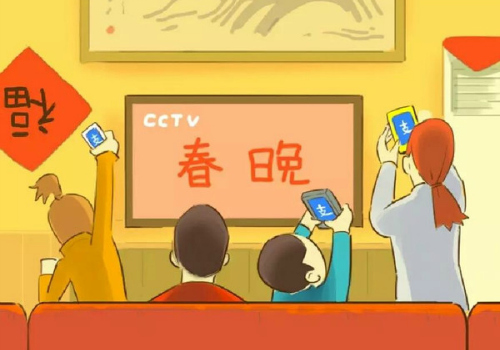
WHAT’S ON WEIBO ARCHIVE | PREMIUM CONTENT ARTICLE
It is time for the CCTV New Year’s Gala, Chunwan; the special annual evening variety show that captures millions of viewers on the night of Chinese New Year. What’s on Weibo provides you with the ins & outs of the 2016 Gala and its social media frenzy, with updates before, during and after the show. *After the live stream of the Gala, we have added most of the videos of all the show’s acts (yes, also the robots) into this blog so you can (re)watch them. The live blog is now closed.* [Premium content]
CCTV Gala Liveblog Updates Chinese Time Zone UTC+8
17:00 Three hours before the show starts! What can we expect tonight? According to the directors, it will be all about singing and dancing today; about 80% of the show’s performances are music and dance. One of the Gala’s directors, Zou Wei, tells CCTV: “We’ve come up with some innovative approaches for the song and dance numbers. We’ll also be moving and changing the stage a lot. The audience will get a very refreshing take. Ninety percent of the song and dance programs are newly created; the remaining 10 percent are a salute to the gala’s past classics.” Besides dance and music, there will also be acrobatic performances and comedy sketches (‘crosstalk’).
17:30 2,5 hours to go. The theme of this year’s CCTV Gala is “You and Me, Our Chinese Dream – Building a Moderately Prosperous Society”. Every year the Gala has a different theme. Last year’s theme was “Family Harmony Yields Success”. The CCTV Gala is known for its political messages, as it is a way for the government to reach an audience of millions.
18:30 There will be a total of 37 acts in tonight’s gala. Amongst the performers are many veterans who have performed at the Gala before, but there are also newcomers, such as the TFBOYS, one of China’s most popular pop groups – they will be performing at the show for the first time. They have a fanbase of nearly 7.5 million on their official Weibo account.
18:45 The TFboys are in the building! The three boys looked somewhat nervous as they entered the Gala venue earlier today. The popular boy band will perform in tonight’s during the show as the 5th act. They told the host their families have all come to Beijing to celebrate the New Year together, eating and exchanging hongbao (red envelopes). When the host asked them how much money was in the hongbao they received from their parents, they did not really want to answer. They might be the ones giving their parents hongbao now..
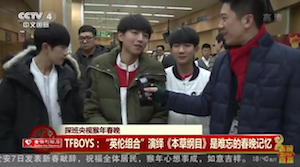
19:00 One hour to go! This year’s gala will be extra special, because it has four extra venues apart from the main one at the CCTV Beijing studio. The additional venues are in southeast China’s Quanzhou city, northwest China’s Xi’an city, south China’s Guangzhou city and Hulun Buir city in Inner Mongolia Autonomous Region, representing the east, west, south and north of China: a gathering of the whole country.
19:30 Just thirty minutes before the start of the show. Tonight’s Gala will be presented by well-known CCTV faces. In the Beijing main venue the gala will be hosted by a total of six presenters, three men and three women, namely: Zhou Tao (周涛), Zhu Jun (朱军), Dong Qing (董卿), Sa Beining (撒贝宁), Li Sisi (李思思) and Nigel Amat. All of them presented the CCTV Gala before, the 51-year-old Mr. Zhu Jun has hosted the gala since 1997. The other venues in Xi’an, Guangzhou, Hulun Buir and Quanzhou will be hosted by, amongst others, Zhu Xun, Ma Yue, Li Jiaming and Ren Luyu, along with some newcomers from local TV stations.
19:50 The biggest show of the year is about to start! The chief director of today’s show is Lu Yitao. Just 38 years old, he is the youngest chief director of the Spring Festival Gala ever.
20:00 Here we go. The opening act is a dance performance called “Spring brings Good Fortune” by, amongst others, actress Yan Ni (闫妮, dressed in blue) and other movie stars. The dancers in the background just formed the shape of ‘fu’, the character for prosperity. The hosts of the night welcome the audiences to CCTV’s 2016 Spring Festival Gala.
20:15 Zhou Tao and Zhu Jun are the first hosts to welcome everybody. They represent the older CCTV generation, having presented the Gala multiple times since 1997.
The CCTV Gala is an annual event since 1983. This year is extra special for the several venues where the Gala is aired: Quanzhou city, Xi’an city, Guangzhou city and Hulun Buir city. Every city has its own hosts, welcoming the audiences in their own local dialect or language.
The second act tonight is a joined act by the two famous bands Phoenix Legend and Jiuye Qiji (玖月奇迹), who sing about “A Beautiful China Rises” (美丽中国走起来). Most of the songs presented tonight are new works made for the CCTV Gala. The performers on the left are the musical performers named ‘Phoenix Legend’, the right band is Jiuye Qiyi.
20.20 Most of the performances tonight are dance and singing, but there will be a total of 7 spoken acts. This short sketch is called ‘Happy grandpa’, performed by Feng Gong (冯巩) who is a familiar face at the CCTV Gala. The sketch is about spending New Year’s Eve, although some netizens seem to have no clue what it was actually about..
20.30 “Let’s Follow the Path of Peace” is a song sung by Chinese singer Zhang Ye (张也, 47 years old). She is especially famous in China for her song “Into a New Era” (走进新时代).
In the meantime, the Gala has become the number one trending topic on Weibo, together with the TFboys, who will soon perform in the show.
20.40 Time to shake your mobile phone! Viewers of the Gala can shake their smartphones to grab a hongbao (red envelope) from CCTV. This is a game that was first introduced last year as a cooperation between WeChat and CCTV.
Here we go for the much-anticipated act of the TFBoys. Aged around 13/14 years old, they are one of China’s most popular acts, often becoming a trending topic on Weibo. They perform together with Yueliang Jiejie, presenter of a children’s show. They are accompanied by dancing cartoons – all China-made.
I am not sure if everybody heard it, but during their act the sound went terribly off during the live broadcast.
20.50 The sixth act of the evening is a short sketch called “Don’t worry” by Sun Tao and other actors about scamming practices per phone in China, and people being oversensitive to being afraid of people cheating you- even when they are not. This act, that is liked by most netizens, is followed by a special performance by different singers from Mainland China, Hong Kong and Taiwan who sing about the ecological heritage of China in the song “Beautiful mountains and rivers of China” (山水中国美). Some of the singers sing in their local dialect. The woman in yellow is the famous Gigi Leung from Hong Kong.
During the show, there seem to be some problems with the sound system. If things would really go wrong, the show has a taped version of the full dress rehearsal. The tape runs together with the live broadcast, so that in the event of a problem or disruption, the producers can seamlessly switch to the taped version without TV audiences noticing anything. We would probably not even know if we were watching the live or the taped version!
21.10 The 8th act of the night will not be performed in the Beijing main location, but in southeast China’s Quanzhou city. It is a song called “Happy Thought of You” (快乐想念). The dancing puppets are typical for the region.
This puppet performance interesting change of pace. Usually when I see puppets perform on CCTV the strings are not so obvious.
— Jeremiah Jenne (@GraniteStudio) February 7, 2016
This performance is followed by a quite stunning dance act by the Atlanta Morningstar dance school by overseas Chinese.
21.30 2.5 hours to go until Chinese New Year! We first see a short film followed by the 11th act; one of the few short sketches of the night called “The General and the Soldiers”. The video of marching troops and the sketch about China’s troops and army life in preparation for the 2015 parade show a strong China. One of the actors is the famous actor Hou Yong (Weibo), who has performed at the Gala two times before. In the sketch, roles are reversed as the soldier teaches the general how to do it right – suggesting equality amongst the people of different positions and sending out a clear message to corrupt officials: don’t forget to be a good communist.
Presenter Dong Qing, in a beautiful red dress, honors China’s veterans, with one old veteran being honored on stage.
21.45 Singer Lei Jia (雷佳) performs the song “I want to tell you” (多想对你说). According to the CCTV, it has always been her dream to perform at the Gala. Her dream has already become a reality multiple times, as she has become a familiar face in the show. The song has been specially produced for the Gala. In the background, we see 55 different ethnic minorities of China in traditional dress, a recurring feature of the annual Chunwan.
The 13th act of the night takes place in Xi’an, one of the four alternate locations where the Gala is taking place tonight. Impressive drums, similar to what we saw during the opening act of the 2008 Beijing Olympics, are followed by the song “The Silk Road”, promoting the success of China’s Go West policy.
The only piece of Chinese opera in this year’s show is part of the Journey to the West (act number 14), in which the main character is the Monkey King.
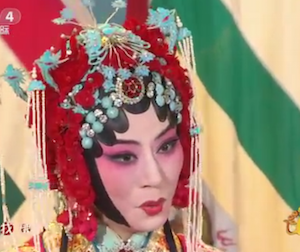
22:00 We have arrived at the 15th act, are you still awake?! Two more hours before New Year’s! This act is shown as a part of showcasing Chinese cultural heritage, introducing the loud Huayin singing style (华阴老腔) at the Gala, with main performances by the pretty Tan Weiwei (谭维维) and Zhang Ximin (张喜民). The 34-year old Tan was the runner-up of the third season of Super Girl, a popular singing contest in China.
22.15 The next act is one of the seven spoken acts of the night, a comical skit about a courier played by several well-known actors.
Meanwhile, complaints about the show are pouring in through social media. It is somewhat of a tradition to comment on the show and complain about it; criticism on the Gala is actually so commonplace that the sentence “there’ll never be a ‘worst’, just ‘worse than last year‘ (央视春晚,没有最烂,只有更烂) has become a popular saying over the years. One of the current critiques is that Liu Xiao Ling Tong (六小龄童, see photo below), the most famous performer of the Monkey King, was not invited to participate in the Journey to the West act.

22:25 “Father and Son” (父子) is supposed to strike the audience’s emotional chord tonight. Singer Yang Yang is one of the more popular acts of the night, attracting younger audiences to watch the show, together with the TFboys. Yang Yang has become especially popular over the last two years. Here, he sings together with famous singer Tong Tiexin. The song is followed by a “public welfare commercial” (公益广告) about the bond between father and son.
*FYI: We are supposed to reflect on our lives and cry here*
22:35 This is the only martial arts act of the night by Donnie Yen or Zhen Zidan (甄子丹) and the Shandong martial arts group. Donnie Yen is a famous Hong Kong actor and martial artist.
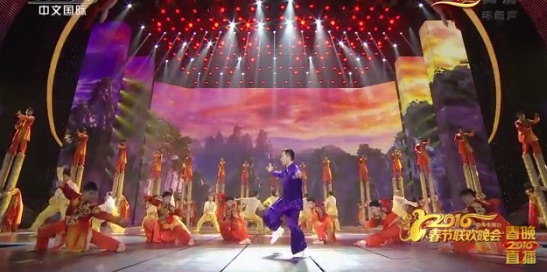
22.45 Amazing display of communist nostalgia during the 20th act of the night, with a performance of different revolutionary songs including the old ‘Without the Communist Party, There is No New China’ (没有共产党就没有新中国), ‘The Bright Red Flowers of Shandan’ (山丹丹花开红艳艳) and ‘The Motherland’ (我祖国). Although the majority of tonight’s compositions are new songs, these are old songs that most Chinese will be very familiar with, especially those growing up during the cultural revolution.
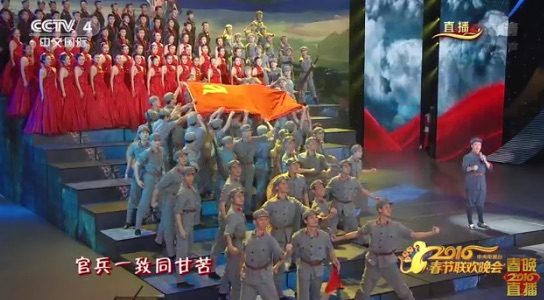
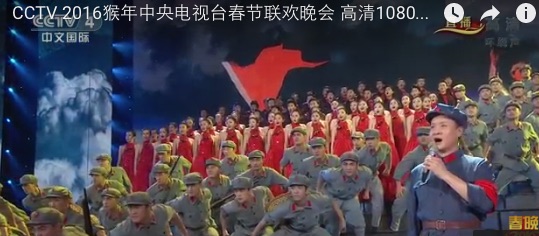
22.50 We have moved from Beijing to Guangzhou for the 21st act of the CCTV Gala. Together with Quanzhou city, Xi’an city and Hulun Buir city, Guangzhou is one of the different alternate venues from which the show is broadcasted this year.
Don’t ask me why, but singer Sun Nan (孙楠) is now performing his song together with 540 dancing robots. He sings about the future ahead – this reinforces the image of Guangdong as the home of China’s tech startups.

23.00 While the noise of fireworks and crackers is starting to fill the streets all over China, we are seeing the only acrobatic act of tonight, performed by Li Tong and the Dengfeng Shaolin college.
23.15 In the final hour of the New Year’s Gala, there are some very famous performers on stage. In this comical sketch, we see actor Donglin Guo (郭冬临) – a Chinese actor and xiangsheng (comic dialogue) performer who always performs in the annual Gala. He has made appearances ever since the 1993 edition. The sketch is about 50,000 yuan that has ‘miraculously’ appeared on Donglin’s bank account, after which his wife accuses people of putting it there for favours. But then their daughters friend appears, and it turns out Donglin lend him money as he was setting up a software company, and this is the money he returned to him. This turns Donglin from a possible corrupt official into a good guy government official who believes in the future of China’s youth.
The comic dialogue is followed by one the night’s many dance performances. This one is title “In Your Embrace” by famous Uyghur dancer Mahire Emet (马依热·艾买提江). The dancers are dressed in traditional clothing, showcasing China’s many colorful & cheerful ethnic minority groups. They just seem to always be happy. It sometimes reminds me of Disneyland’s “It’s a small world after all…”
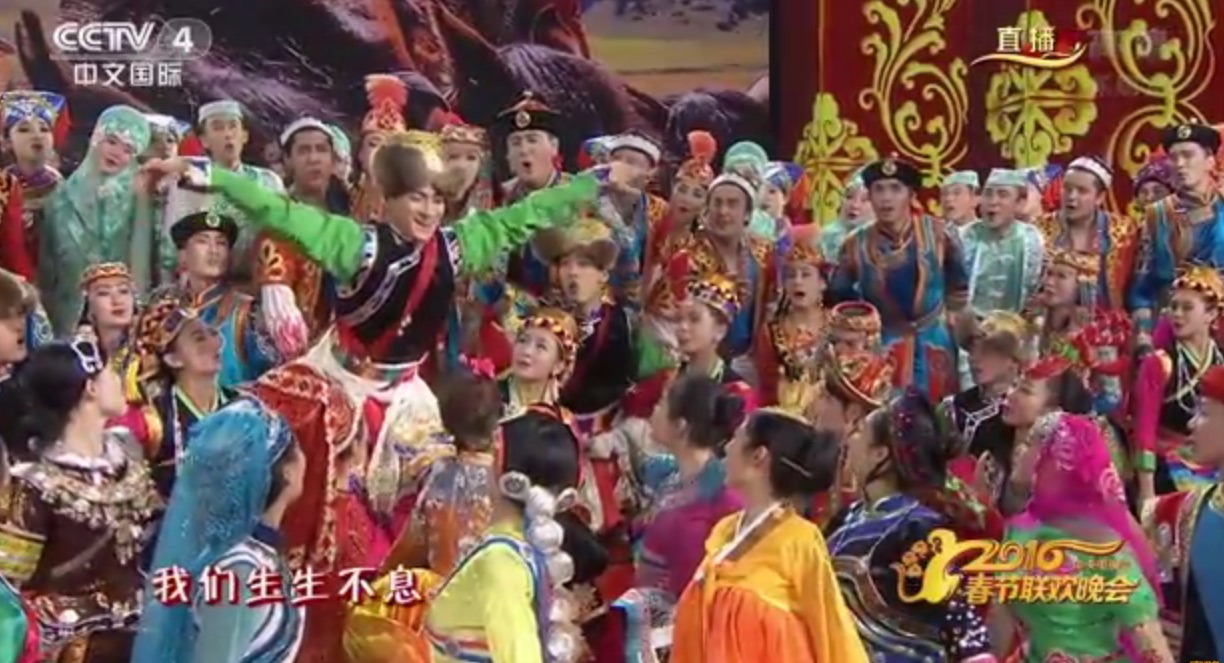
23.30 The last venue of the night is Inner Mongolia’s Hulun Buir city, where we see the hosts dressed in local traditional clothing and speaking some of the local language. It is interesting to see the contrast between the venue cities tonight, where some, such as Hulun Buit, are portrayed as being very ‘ethnical’ and others, such as Guangzhou (with the robots), is showcased as very modern, trendy and technical.
The act is followed by a performance of the famous Vicky Zhao. She is one of the bigger stars of tonight’s Gala. She is a Chinese actress, pop singer, and film director. An incredibly popular actress in various top TV shows in China, she is considered one of the top four actresses in China and is one of the most famous Weibo celebrities; she has over 73 million followers!
23.40 We have arrived at the 27th act of the night, and there are just twenty minutes left before the Year of the Monkey starts. Chen Sisi (陈思思) sings ‘Snow Love’ with performers from the Beijing Sports Academy – this, according to the hosts, is in honor of Beijing being the first city to host both the Summer and the Winter Olympics (2022).
23.45 This is the last spoken sketch for tonight, only followed by a xiangsheng (comic dialogue) just before the end of the show. This sketch is about internet shopping, and features Chinese skit actor Pan Changjiang. In his early years, he regularly appeared in the Gala.
23.55 Almost time for the New Year! The hosts first list all the country embassies wishing China a happy new year, before Yin Xiumei (殷秀梅) sings the song ‘Honor & Glory’: a moment to reflect on China, the great nation, and its leaders. In the video behind the singer, we see Mao Zedong and other leaders, with special focus on ‘Daddy Xi’.
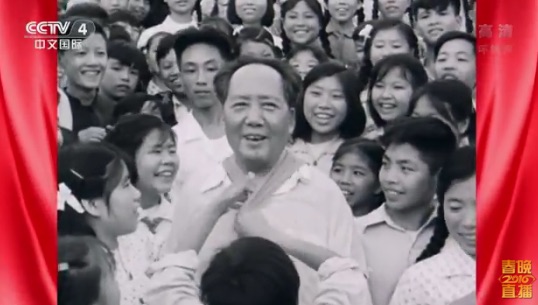


0.00 Happy new year! The hosts wish everybody a Happy Year of the Monkey (and so does What’s on Weibo).
0.05 The New Year is welcomed with the song “Meeting Spring” by various famous singers such as the famous baritone Liao Changyong. The song is immediately followed by one of the evening’s “public welfare commercials”, in which the importance of family ties is emphasized – part of the China dream.
0.10 A young man named ‘Yif’ is tonight’s magician. Yif also seems to have done some magic on his own face. He is a professional magician from Taiwan. On his official Weibo account, he told his fans that he was incredibly nervous for tonight’s performance, as it is the first time he appears on the CCTV Gala.
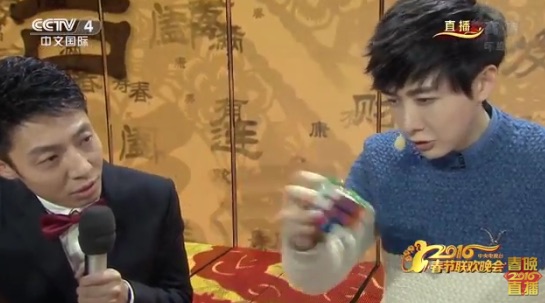
The Gala’s hosts Zhu Jun and Zhou Tao announce the next act, which is a xiangsheng act. Xiangsheng, also known as ‘crosstalk’, is a traditional comic dialogue, which is mostly performed as a dialogue between two performers (in this case, by Li Yinfei 李寅飞 and Li Ding 李丁). The focus is on language jokes, which are sometimes hard to grasp for a laowai like myself. It is one of China’s most popular performing arts, and is typically performed in the Beijing accent. Some Chinese media wrote about the fact that this year’s Gala only features one xiangsheng act, as there previously were more. This year, the focus of the evening clearly is on song and dance.
0.20 We are nearing the end of the show, but not before the show puts more emphasis on the Gala’s theme: “You and Me, Our Chinese Dream – Building a Moderately Prosperous Society”. This song, titled “Small and Big Dreams” is sung by Wang Zineng and Ping An.
0.35 The last two acts of the night are the songs “Lucky Lucky” and “Unforgettable Night”. The first is sung by Sa Dingding 萨顶顶 who is joined by a dancing group from Yunnan.
The last song of the night is performed by various performers, bringing together some of the country’s major celebrities from different generations including the 71-year-old folk singer Li Guyi (李谷一) and the 8-year-old child star Zhou Anxin (周安信). They conclude the night with a song about their good homeland China. The hosts wish you all a happy new year.

0.45 That’s a wrap – happy new year 新年快乐!
About the Gala
The CCTV New Year’s Gala (中国中央电视台春节联欢晚会 or Chunwan 春晚) is an annual live television event that is broadcasted by state enterprise CCTV on the evening of Chinese New Year. It has been broadcasted since 1983, and is watched by over 700 million people. It is the most-watched variety shows in the world and is much anticipated every year – somewhat comparable to the Oscars or the Super Bowl. The Gala features different acts, including singing, dancing and comedy, in a time frame of around 4 hours.
It is a tradition for families to gather around the TV to watch the Gala before the New Year comes at midnight. It is also somewhat of a tradition to comment on the show and complain about it; criticism on the Gala is actually so commonplace that the sentence “there’ll never be a ‘worst’, just ‘worse than last year‘ (央视春晚,没有最烂,只有更烂) has become a popular saying over the years (Wang 2015, 192).
The 2016 Edition
This is the 34th edition of Chunwan (February 7th, 2016). This year the show lasts a total of 4 hours and 18 minutes, starting on 20.00 and ending 00.18.
This year’s show, like last year’s, has its own mascot. As this will be the Year of the Monkey, it is a colorful monkey named Kang Kang. The mascot was revealed on CCTV’s Weibo account on the evening of January 21st. The mascot was ridiculed by netizens, who thought it was ugly. The 3D design (image below, on the right) was different from the original sketch (left). According to the majority of Weibo’s netizens, the designers of the 3D version had mistaken Kang Kang’s paws for balls, resulting in a Kangkang with ‘tumors on his ears’.
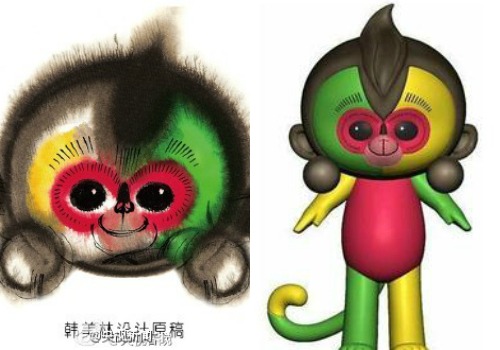
The current version of Kang Kang as pictured below has been adjusted; he no longer has ‘tumors’ growing from his head.
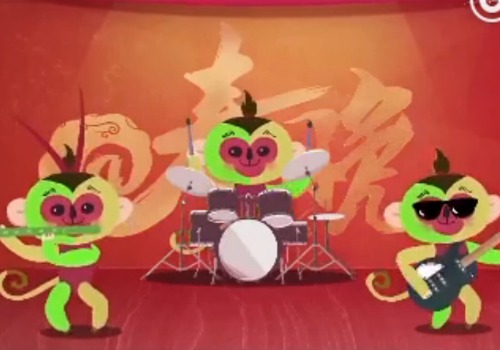
Social Media
Chunwan is a hot topic on Sina Weibo and WeChat, as millions of people are watching and share their comments on the show through social media. The Gala’s official Weibo account has over 7,5 million followers. Sina Entertainment (17+ million followers) also writes about the show through their official Weibo account.
One important new feature of the show that links it to social media platforms is the exchange of hongbao, red envelopes with money, which is a Chinese New Year’s tradition (also read our article about Lucky Money). During the show, viewers are able to receive virtual hongbao by shaking their smartphones. This new cooperation between the CCTV Gala and the WeChat app first started in 2015. Last year, when the game was announced during the live broadcast, WeChat users shook their phones 11 billion times. The value of these monetary gifts was around 500 million RMB (76 million US dollar).
The hongbao game attracts more people to watch the show, which is often considered boring or old-fashioned by younger generations. This year the game will start again, increasing the Gala’s viewer ratings. One Weibo netizen comments: “Actually, there are many people who want to watch the Gala now. The reason is simple: it’s not for the show but for the red envelopes.”
The Live Show
Although the Gala is a live broadcast from CCTV’s No.1 Studio, every year’s show has a taped version of the full dress rehearsal. As described by Scocca (2011), the tape runs together with the live broadcast, so that in the event of a problem or disruption, the producers can seamlessly switch to the taped version without TV audiences noticing anything.
According to the CCTV, the committee members of the Politburo of the Communist Party of China already attended the full dress rehearsal on Friday night.
Please check out this blog on Sunday, February 7th, from 19.00 China Standard Time (CST) +0800 UTC (12.00 CET) for more information about the show and its programme. New updates will be added on the top of this page.
– By Manya Koetse
Follow @WhatsOnWeibo
References
Wang Ge. 2015. “Popular Spring Festival Gala language: Sociocultural Observations.” In Linda Tsung and Wei Wang, Contemporary Chinese Discourse and Social Practice in China, 185-200. Amsterdam/Philadelpia: John Benjamins Publishing Company.
Scocca, Tom. 2011. Beijing Welcomes You: Unveiling the Capital City of the Future. New York: Riverhead Books.
Featured image from ZZM3.com: http://www.zzm3.com/gear/rs/457.html
©2016 Whatsonweibo. All rights reserved. Do not reproduce our content without permission – you can contact us at info@whatsonweibo.com.
Manya is the founder and editor-in-chief of What's on Weibo, offering independent analysis of social trends, online media, and digital culture in China for over a decade. Subscribe to gain access to content, including the Weibo Watch newsletter, which provides deeper insights into the China trends that matter. More about Manya at manyakoetse.com or follow on X.

China Celebs
Beauty Influencer Du Meizhu Accused of Scamming Fan Out of $27K
Published
3 weeks agoon
June 27, 2025
🔥 Quick Take: Trending in China
This is a brief update from our curated roundup of what’s trending in China this week. A version of this story also appears in the Weibo Watch newsletter. Subscribe to stay in the loop.
Chinese beauty influencer and livestreamer Du Meizhu (都美竹) is facing online backlash this week after a former female fan filed a police report accusing her of scamming her out of nearly 200,000 yuan (approx. US$27,800).
The fan, known online as Sister Bing (Weibo handle @冰点人a冰点), has come forward with detailed allegations, claiming Du began swindling her in 2022.
Du Meizhu rose to national prominence in 2021 when she was 19 years old and became the first person to publicly accuse Chinese-Canadian pop star Kris Wu (吴亦凡) of rape and sexual misconduct. After at least 24 more victims also came forward, Wu was formally arrested on suspicion of rape in mid-August 2021 and was later sentenced to 13 years in prison.
It was around this time that ‘Sister Bing,’ whose real name is Ms. Zhu (朱, born 1979), started following Du Meizhu on social media. As a hard-working single mother of a daughter, she said she sympathized with Du and wanted to show her some support. In a Weibo post published in 2024, she detailed how Du Meizhu began noticing Zhu’s online interactions in early 2022 and added her as a friend on WeChat.
In private conversations, Du shared complaints about her difficult life, and as the two talked more and more, Zhu began transferring small amounts of money to help. Over time, Du said she needed money for various things—from financial support for school to legal disputes and expensive medical treatments for family members. Between 2022 and 2023, Zhu claims she transferred nearly 200,000 yuan in total.
At the end of 2023, Zhu–who works as a taxi driver–urgently needed money due to a family crisis. She reached out to Du to ask if she could repay the money. According to Zhu, she only returned 30,000 yuan (US$4,180) and refused to pay more, even though at the same time, Du was allegedly flaunting luxury brand purchases and had plans to buy a villa.
On June 25, 2025, Zhu posted an update on her Weibo account, saying she had traveled to Ulanhot City in Inner Mongolia – Du’s hometown – to seek justice and report the case to local authorities.
Du Meizhu has responded to the allegations on social media, writing that she “won’t admit to things I haven’t done.” She does not deny that Zhu gave her money.
She writes: “When she had money, she was lavishly spending it on gifts in all kinds of livestreams. Now that she’s broke, she wants it back from the streamers? After I transferred her thousands of yuan, she’s still not satisfied and is now starting to extort me. No amount of moral pressure will work. I have a clear conscience!”
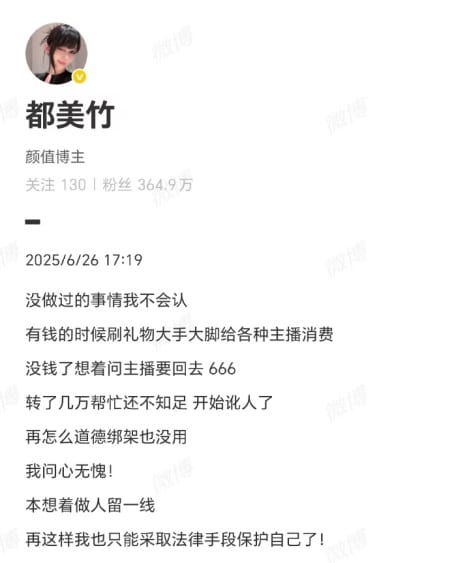
The post by Du Meizhu
The case has blown up online. One post by Ms. Zhu has already received over 133,000 likes and is still gaining traction.
But the developments surrounding the case are puzzling to some. Du Meizhu has long maintained a social media image of wealth, showcasing a lifestyle filled with Dubai travel, horseback riding, luxury food, and fashion. Why would she need to take money from a single mum? Du is being criticized not only for faking her wealth, but also for accepting so much money from a woman who clearly needed the money for her own family.

Du Meizhu social media photos.
Although the story is attracting a lot of attention online because it exposes private conversations between Du and the woman – and, frankly, many netizens just enjoy the drama, – it also says a lot about China’s thriving livestreaming industry and just how close online followers can feel to the influencers they follow. In these kinds of online communities, it is common for fans and followers to send livestreamers money or ‘virtual gifts’.
In the case of Ms. Zhu, some netizens doubt that she can prove in court that she loaned Du the money instead of gifting it to her. People also criticize Zhu: why did she spend so much money on an online influencer instead of on her own daughter?
Either way, many Chinese netizens feel that it was not right of Du Meizhu to take advantage of a single mum like that. Even if she’s not legally wrong, they feel she lacks moral integrity.
Du’s most recent social media post—featuring her in so-called “old money fashion” outfits—has only added fuel to the fire. Dozens of commenters flooded the post with demands that she repay Ms. Zhu. Though Du seemingly tried to delete the negative comments, they kept pouring in. “At this rate, there won’t be any comments left,” one user wrote.
Whether or not Du Meizhu ultimately faces legal consequences, the backlash is already taking a toll. She might escape the courtroom, but won’t be able to escape the court of public opinion.
By Manya Koetse
(follow on X, LinkedIn, or Instagram)
Spotted a mistake or want to add something? Please let us know in comments below or email us. First-time commenters, please be patient – we will have to manually approve your comment before it appears.
©2025 Whatsonweibo. All rights reserved. Do not reproduce our content without permission – you can contact us at info@whatsonweibo.com.
China Celebs
Earring Gate: Huang Yangdiantian and the 2.3 Million RMB Emerald Earrings
Online sleuths connect emerald earrings to post-earthquake business ties—sparking official investigations.
Published
2 months agoon
May 25, 2025By
Ruixin Zhang
Dear Reader,
This week, the Chinese internet exploded over a pair of earrings worn by a child actress.
In recent years, China’s netizens have been paying closer attention to so-called “nepo babies”—the children of the rich and powerful whose success often seems tied more to family connections than to talent.
Some, like Huawei’s heiress Yao Anna (姚安娜), have been criticized for using family ties to enter the entertainment industry. Others, like the infamous “Miss Dong” in the recent medical scandal, have sparked public outrage for abusing privilege to bend academic rules.
Facing economic difficulties and a tough job market, the public’s tolerance for nepotism and corruption is running increasingly thin. But when these issues touch on national trauma, including natural disasters and charity efforts, the public anger runs even deeper.
That’s why a Chinese teenage actress named Huang Yangdiantian (黄杨钿甜) recently found herself at the center of an online storm.
Earring Gate: Behind the Sparkle
Huang, born in 2007, started her career as a child actress in the 2017 historical drama Princess Agents (楚乔传).

She later gained more popularity by starring in other hit series, including Ruyi’s Royal Love in the Palace (如懿传), and also built an online following.
The recent scandal broke out after Huang shared a series of photos on Xiaohongshu, where she has around 328,000 followers. In the photos, meant to celebrate her 18th birthday, she’s seen proudly wearing a pair of sparkly emerald earrings. In the caption, she mentioned they belonged to her mom.
Sharp-eyed netizens quickly identified the earrings as a pair from the British luxury brand Graff—worth a jaw-dropping 2.3 million RMB (319,000 USD).

Digging deeper, online sleuths also found a Weibo post from 2018 showing Huang’s mother wearing a Cartier bracelet, which now retails for around 450,000 RMB (62,400 USD).
Considering Huang’s limited acting experience and modest earnings as a child actress, these luxury items raised eyebrows—and questions about where the family’s wealth was really coming from.
The “online detectives” didn’t stop there. They discovered that Huang’s father, Yang Wei (杨伟), was once a public official in Ya’an City (雅安市), Sichuan Province. After a major 7.0-magnitude earthquake struck Yan’an in 2013 (the Lushan Earthquake), Yang was reportedly involved in post-earthquake reconstruction projects, including investment and tendering.
Interestingly, in 2014, just a year after the earthquake, Huang’s family registered a film and culture company in Shenzhen with 5 million RMB (694,000 USD) in capital. Initially, the company’s legal representative was Huang’s uncle, followed by her mother in 2016. But after Yang resigned from public service, he took over as the official legal representative.
During the pandemic in 2020, Yang also registered a biotech company, which was later rebranded as a beauty and cosmetics trading business. The timing—one company during post-quake reconstruction, then another during a global health crisis—raised suspicions about whether Yang was using national emergencies as business opportunities.
It was also discovered that the Yang family currently lives in a luxury villa in one of Shenzhen’s most upscale neighborhoods, valued at over 100 million RMB (approximately 13.8 million USD).
How did Yang get enough money to start such companies and purchase a multi-million yuan villa? Even if all his official work and business ventures were legitimate, netizens pointed out it still wasn’t enough to explain the family’s enormous wealth.
Huang’s Father Responds, Netizens Dig Deeper
As the controversy grew, Huang’s father responded on May 16 via Weibo, using an account simply named “Huang Yang’s Dad” (黄杨爸爸).
In his post, he claimed that the emerald earrings were fake and of little value. He acknowledged having worked for the Yan’an government but denied any involvement in post-earthquake work, saying the online accusations against him were a case of mistaken identity—“just someone with the same name.” He even added, “I’ve never been corrupt—feel free to report me.”
But the “same name” defense didn’t hold up for long.
In a second wave of ‘detective work’ by online sleuths, netizens found a phone number listed under the name “Yang Wei” on a government website related to post-earthquake reconstruction projects in Ya’an. Some tried sending a small transfer to this number via Alipay, revealing that the profile picture linked to that account was a photo of Huang and her mother when she was younger, immediately making his “same name” explanation completely implausible.
Soon after, the account could no longer be found on Alipay, but because the number was likely tied to many services and platforms, it wasn’t easy to erase entirely. People quickly traced the same phone number to Yang’s accounts on other platforms. Around the same time, the legal representatives of the family’s companies were abruptly changed, only further fueling public suspicion.
Huang’s talent agency issued a statement calling the online rumors false but didn’t offer any concrete evidence to back that up.
By now, a local investigation by the Ya’an Discipline Inspection Commission has confirmed that Yang engaged in illegal business activities and that the birth of his second child (Huang’s younger brother) violated the one-child policy still in effect during his time as a government official. However, the investigation also denied any misappropriation of post-earthquake reconstruction funds. (link).
Most netizens find that many key questions are still left unanswered, and continue to investigate and dissect every single detail relating to Yang, Huang, and the earrings.
More than Online Gossip: Privilege & Public Grief
Some argue that the online speculation surrounding this case has now gone too far.
But for many Chinese netizens, especially younger ones, this isn’t just another scandal passively consumed by the so-called “melon-eating masses” (吃瓜群众). It strikes a nerve because it brings together several sensitive issues all at once.
Although China’s “nepotism babies” frequently spark backlash, they’re also everywhere, from business and entertainment to political and academic circles. For years, the fù èr dài (富二代), or “second-generation rich”—children of those who built fortunes after China’s economic reforms in 1978—have drawn criticism for flaunting wealth and behaving irresponsibly.
Through the years, new terms have been added to China’s nepotism lexicon: there’s xīng èr dài (星二代), referring to the children of celebrities; guān èr dài (官二代), a negative label for the children of government officials or bureaucrats; and hóng èr dài (红二代) and jūn èr dài (军二代), used to describe the children of political elites and military families.
Nepotism is closely tied to corruption—another painful issue in society that surfaces time and again. It’s particularly sensitive because it undermines more than just trust in (local) leadership; it erodes faith in meritocracy and leads the public to question the fairness of the entire system.
When these kinds of issues become entwined with national disasters and charity work—where the already privileged are seen to illegally profit from public grief for private gain—it becomes more than just a breach of public trust. It crosses a moral red line in the most extreme way.
For many young Chinese today, earthquake disasters are not distant history – they’re part of a shared collective memory that still strikes a nerve. In the comment sections of related news posts these days, many netizens recall donating money and supplies to earthquake relief efforts, now wondering whether their goodwill ever truly reached those in need.
The timing has only added fuel to the fire. The controversy erupted around the 17th anniversary of the devastating 2008 Wenchuan earthquake (5.12). Though that disaster is different from the 2013 earthquake, both struck Ya’an City, and public discussions has started to lump them together, bringing back old memories and concerns about disaster relief and public trust.
Back in 2009, Professor Deng Guosheng (邓国胜) from Tsinghua University studied where the 76.7 billion RMB (about 10.5 billion USD) in Wenchuan relief donations had gone. He found that nearly 80% of the money was controlled by the government or groups linked to it, like the Red Cross, with little transparency on how it was spent. People basically have no idea how the money they donated was spent.
In light of the recent controversy, Deng’s study and its numbers are being brought up again in many threads across Chinese social media. Today, as much as 15 years ago, the call for transparancy on how the public’s money is being used in the post-disaster time period is just as relevant.
One Weibo commenter wrote: “For context, in all of 2024, Ya’an City’s general public budget revenue was 8.4 billion RMB in total. This means that the total amount of donations and supplies after the 2008 earthquake was equivalent to 25 years of Ya’an’s current public budget revenue!” He later added: “It’s really not unreasonable at all for the public to ask questions about the authenticity of a pair of 2.3 million RMB earrings.”
Others agree: “It’s absolutely valid for everyone to focus on whether Huang Yangdiantian’s father was involved in embezzlement or bribery (..) When it comes to a tragic event like the Wenchuan earthquake, claims should especially be backed by solid evidence.”
The speculation about Huang’s family wealth goes well beyond celebrity gossip or a “nepo baby” narrative; it reflects a deeper call for clean governance and stricter oversight of how public and charitable funds are managed and spent.
As for Huang, the consequences of her glamorous photoshoot and the controversy it sparked are already unfolding. While her father has now become the target of further formal investigation by disciplinary authorities, it’s rumored that Huang has been removed as the female lead for the historical drama Peacock Bone (雀骨), as well as casting uncertainty over the viability of some of her upcoming projects.
At least we almost certainly know one thing: she won’t be wearing those earrings again any time soon.
Best,
Ruixin Zhang & Manya Koetse
Subscribe
What’s on Weibo is a reader-supported publication, run by Manya Koetse (@manyapan), offering independent analysis of social trends in China for over a decade. To receive new posts and support our work, consider becoming a paid subscriber.


A Very Short Guide to China’s Most Popular Designer Toys

The Next Labubu: What the Rise of Wakuku Tells Us About China’s Collectible Toy Wave

Jiehun Huazhai (结婚化债): Getting Married to Pay Off Debts

Yearnings, Dreamcore, and the Rise of AI Nostalgia in China

Beauty Influencer Du Meizhu Accused of Scamming Fan Out of $27K

China Is Not Censoring Its Social Media to Please the West

Inside the Labubu Craze and the Globalization of Chinese Designer Toys

China Reacts: 3 Trending Hashtags Shaping the Tariff War Narrative

China Trending Week 15/16: Gu Ming Viral Collab, Maozi & Meigui Fallout, Datong Post-Engagement Rape Case

Chinese New Nickname for Trump Mixes Fairy Tales with Tariff War

Understanding the Dr. Xiao Medical Scandal

Behind the Mysterious Death of Chinese Internet Celebrity Cat Wukong

Do You Know Who Li Gang Is? Anti-Corruption Official Arrested for Corruption

China’s Major Food Delivery Showdown: What to Know about the JD.com vs. Meituan Clash

Earring Gate: Huang Yangdiantian and the 2.3 Million RMB Emerald Earrings
Get in touch
Would you like to become a contributor, or do you have any tips or suggestions? Get in touch here!
Popular Reads
-

 China Society10 months ago
China Society10 months agoDeath of Chinese Female Motorcycle Influencer ‘Shigao ProMax’ Sparks Debate on Risky Rides for Online Attention
-

 China World11 months ago
China World11 months agoChina at Paris 2024 Olympics Trend File: Medals and Moments on Chinese Social Media
-

 China Memes & Viral11 months ago
China Memes & Viral11 months agoTeam China’s 10 Most Meme-Worthy Moments at the 2024 Paris Olympics
-
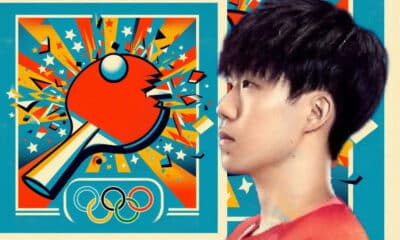
 China Memes & Viral12 months ago
China Memes & Viral12 months agoAbout Wang Chuqin’s Broken Paddle at Paris 2024




Joey
February 8, 2016 at 12:52 pm
Is it possible to publish a reverse version of the article? For those who want to read the liveblog after the fact 🙂 Now you have to go all the way down and scroll up.
Manya Koetse
February 8, 2016 at 12:54 pm
Ok Joey, check back in about an hour.
Joe
February 8, 2016 at 5:52 pm
Thank you so much for this!!!